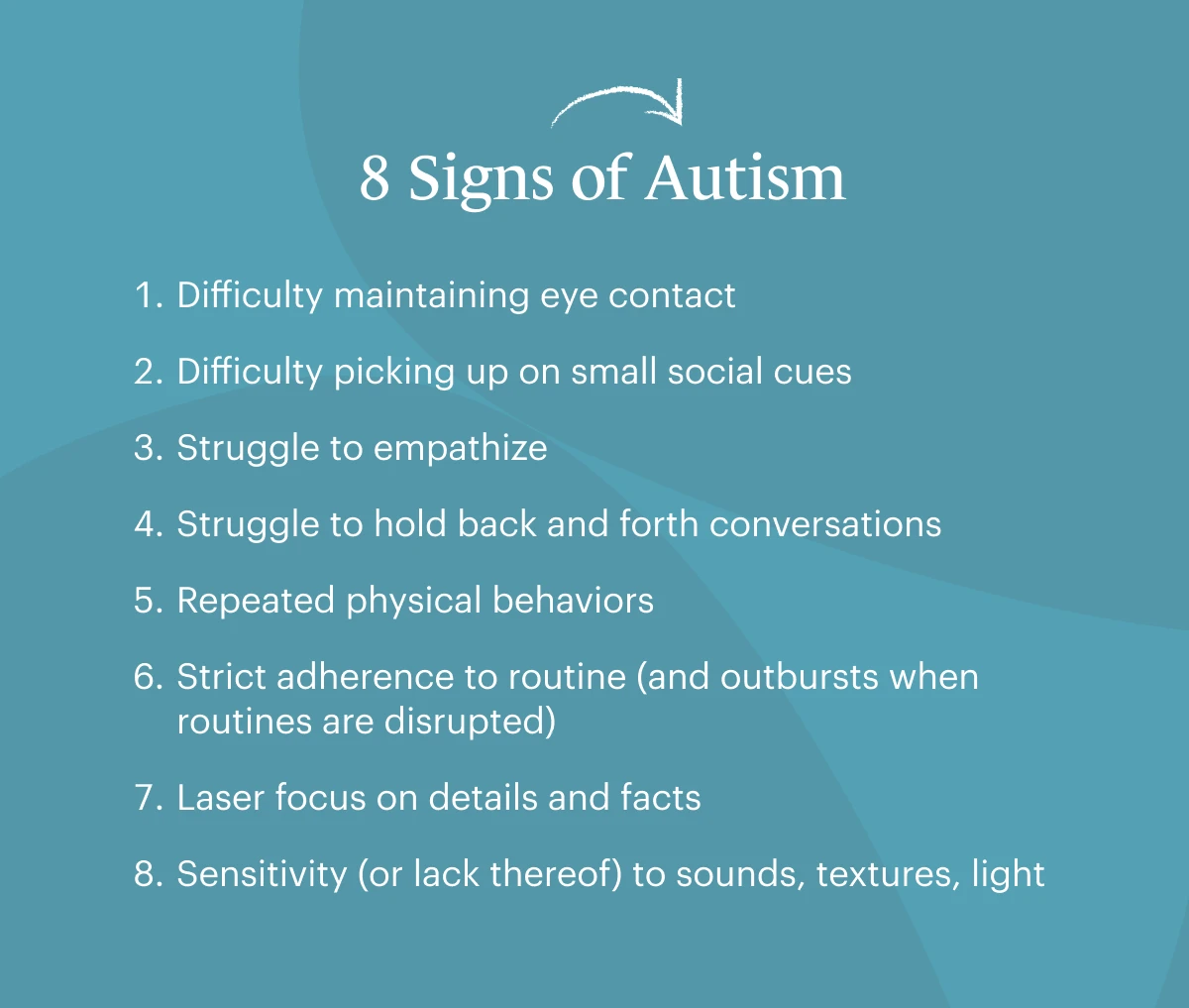What happens when working with an Autism Behavioral Therapy program plan
What happens when working with an Autism Behavioral Therapy program plan
Blog Article
Key Signs and Signs to Recognize in Individuals With Behavioral Autism
When you encounter a person with behavior autism, acknowledging key symptoms and signs is important. You might see challenges in social interactions and communication, as well as a solid need for routines. In addition, sensory sensitivities can lead to overwhelming experiences. Understanding these qualities can boost your assistance and treatments, but there's even more to discover about how these habits show up in daily circumstances. Let's explore what these signs actually appear like.
Challenges in Social Communications
When you engage with a person on the autism spectrum, you could see they battle with social cues and communication. These challenges can make social communications really feel overwhelming for them.
Additionally, you may locate that they choose regimens and acquainted setups, which can limit their desire to engage in new social scenarios. When they do engage, they might discuss their interests in fantastic information without observing if you're interested. This can lead to one-sided conversations that leave you feeling separated. Recognizing these challenges can aid you come close to interactions with empathy and persistence, fostering a more comfy setting for both of you.
Problem With Verbal and Non-Verbal Interaction

Non-verbal communication can be much more difficult. You might see a lack of eye call or restricted use gestures, which can make interactions really feel unpleasant. Faces might not always align with the discussion, resulting in confusion regarding their feelings. Acknowledging these signs is essential, as it helps you far better support and engage with individuals on the autism spectrum. By comprehending their interaction obstacles, you can cultivate a lot more meaningful connections and provide a more supportive environment.
Repetitive Actions and Regimens
Communication difficulties often accompany various other signs of autism, such as repetitive behaviors and a solid choice for routines. You could observe that individuals with autism often involve in particular, repetitive actions, like hand-flapping, shaking, or repeating phrases. These behaviors can offer convenience and a feeling of control in a typically frustrating globe.
When they comply with a structured routine,Regimens are equally important; several people prosper. You might locate that modifications to these regimens can lead to substantial distress. As an example, if they have a day-to-day ritual of eating breakfast at a details time or following a particular course to college, any kind of interruption can create anxiousness.
Identifying these patterns helps you understand their behavior and supply assistance. By accommodating their requirement for regular and enabling repetitive actions, you can create a much more comfortable setting that eases their obstacles.
Sensory Sensitivities

Typical Sensory Triggers
Sensory level of sensitivities can substantially affect every day life for people with autism, as specific stimulations usually set off overwhelming responses. Usual sensory triggers consist of loud noises, bright lights, and strong smells. You could observe that unexpected noises, like alarms or sirens, create anxiety or distress. Similarly, fluorescent illumination in stores can feel uncomfortable and harsh. Textures can also play a considerable role; rough fabrics or specific food textures may be excruciating for you. Furthermore, crowded places can bewilder your detects, making it hard to focus or kick back. Comprehending these triggers can assist you handle your atmosphere better. By knowing what influences you, you can take actions to minimize pain and enhance your day-to-day experiences.
Behavioral Actions Explained
Comprehending your behavioral responses to sensory level of sensitivities is necessary, as they commonly expose exactly how you connect with the globe. You could observe that specific audios, lights, or appearances bewilder you, leading to anxiousness or pain. When confronted with these stimulations, you could withdraw, cover your ears, and even react strongly. These reactions aren't just quirks; they're your method of dealing with overstimulation. You may additionally discover on your own seeking certain sensory experiences, like deep pressure or quiet environments, to help ground yourself. Recognizing these patterns helps you comprehend your needs far better and can guide how you interact them to others. By recognizing your sensory level of sensitivities, you can function in the direction of developing an atmosphere that feels much more comfy and workable for you.
Coping Techniques Overview
Identifying your sensory level of sensitivities is simply the very first step; currently it's time to explore coping strategies that can assist you take care of those experiences effectively. Beginning by creating a sensory toolkit customized to your requirements. Developing an organized regimen can additionally give predictability, reducing anxiety around sensory overload.
Limited Passions and Emphasis
While read here numerous people establish a large range of interests, those with autism typically demonstrate restricted passions and an intense concentrate on certain subjects. You may discover that someone with autism can spend hours diving right into their preferred subject, whether it's a particular kind of train, a details flick, or a scientific concept. This extreme emphasis isn't just a pastime; it can end up being a central component of their identity and social interactions.
You might find that conversations revolve around these rate of interests, and they may battle to participate in wider topics. For them, these focused interests offer comfort and a sense of mastery. While it's vital to urge exploration of new subjects, respecting their enthusiasms is equally essential. By comprehending and recognizing these restricted rate of interests, you can cultivate a supportive environment where they really feel valued and understood, permitting more meaningful connections and interactions.
Emotional Regulation Troubles
People with autism commonly face obstacles in emotional regulation, which can be affected by their intense emphasis on details rate of interests. You could notice that when a person is deeply taken part in a recommended task, they can experience strong feelings, whether exhilaration or irritation. When points don't go as prepared., this intensity occasionally makes it difficult for them to move gears or handle their sensations - Aba Therapist Near Me.

Irregularity in Developing Landmarks
When it comes to developing milestones, you'll discover that individuals with autism commonly reveal a vast range of variability. You may see a child excel in language abilities however battle with social communications.
It's essential to recognize that each person's trip is special. Observing these patterns can assist you understand their strengths and requires much better.
Frequently Asked Questions
Exactly How Is Autism Identified in Children and Adults?
To detect autism in children and grownups, specialists assess behavior, interaction abilities, and social communications. If a private fulfills the standards for autism range here are the findings problem., they commonly use standardized examinations, interviews, and monitorings to determine.
Are There Different Types of Autism Spectrum Disorders?
Yes, there are various types of autism spectrum conditions, including Asperger's disorder and prevalent developmental disorder-not otherwise defined. Each kind varies in extent and characteristics, so comprehending these differences can help you much better assistance individuals with autism.
What Therapies Are Effective for People With Autism?
When thinking about reliable treatments for individuals with autism, you'll discover choices like Applied Habits Analysis, speech treatment, and work therapy. Each technique can aid boost communication, social skills, and everyday operating tailored to individual needs.
Can People With Autism Lead Independent Lives?
Yes, individuals with autism can lead independent her explanation lives. With the right assistance, abilities training, and resources, you can aid them establish self-sufficiency, manage daily jobs, and thrive in various atmospheres, cultivating their self-reliance.
Just How Can Family Members Support Loved Ones With Autism?
You can sustain your loved ones with autism by producing a structured environment, urging their interests, exercising persistence, fostering communication, and advertising social abilities. Commemorate their achievements, regardless of just how little, and develop a supportive area.
Although lots of individuals on the autism spectrum can comprehend and make use of language, they commonly deal with significant challenges with both spoken and non-verbal interaction. Recognizing these signs is essential, as it aids you better assistance and involve with individuals on the autism range. You might discover that people with autism often engage in particular, repeated actions, like hand-flapping, rocking, or duplicating phrases.Sensory level of sensitivities can considerably impact daily life for people with autism, as certain stimulations usually trigger frustrating reactions.When it comes to developing turning points, you'll notice that people with autism frequently show a vast array of variability.
Report this page